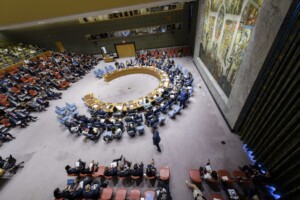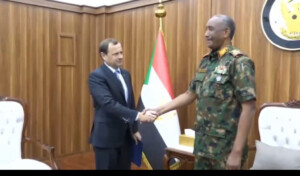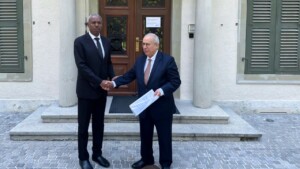Rebel alliance announces support for Sudan’s upcoming framework agreement
The Sudan Revolutionary Front (SRF), an alliance of rebel movements that signed the Juba Peace Agreement with the Sudanese government in October 2020, announced yesterday that it will back the upcoming political agreement, brokered by the AU-IGAD-UN Trilateral Mechanism.
 The Sudan Revolutionary Front and the Sudanese government meet to discuss peace agreement documents in Juba on August 23, 2020 (File photo: Social media)
The Sudan Revolutionary Front and the Sudanese government meet to discuss peace agreement documents in Juba on August 23, 2020 (File photo: Social media)
The Sudan Revolutionary Front (SRF), an alliance of rebel movements that signed the Juba Peace Agreement with the Sudanese government in October 2020, announced yesterday that it will back the upcoming political agreement, brokered by the AU-IGAD-UN Trilateral Mechanism.
Their condition is that their amendments will be included in the draft Constitution Charter prepared by the Sudanese Bar Association in August, which was amended after comments from the military.
In a statement following a two-day meeting of the SRF Leadership Council, the former rebel leaders confirmed that their amendments are related to the power structures of the transitional period and the Juba Peace Agreement.
They stated their support for the ongoing political process, calling the Constitutional Charter and the military’s input “an acceptable basis to build on.”
The SRF said it will discuss its amendments with the FFC-CC, the mainstream Democratic Unionist Party (that joined the rebel-dominated FFC-Democratic Block lately), the [Islamic] Popular Congress Party and Ansar El Sunna El Mohamediya.
The SRF is headed by El Hadi Idris, who was appointed member of Sudan’s Sovereignty Council following the Juba Peace Agreement (JPA), and remained in this position after the coup d’état under the leadership of El Burhan in October last year.
SRF member Malik Agar, who is also a member of the Sovereignty Council, denounced the upcoming framework agreement between the mainstream Forces for Freedom and Change (FCC-CC) and the military junta a few days ago. He described it as “a waning opportunity which will further complicate the political scene.”
The current framework agreement, to be signed by the Forces for Freedom and Change which includes a review of the JPA, implies that the peace agreement will be cancelled, according to Agar.
The head of the Sovereignty Council and Commander-in-Chief of the Sudan Armed Forces Abdelfattah El Burhan, stated that the initiatives to end the current stalemate will certainly lead to an agreement which facilitates the formation of a non-partisan civilian government of technocrats, leading the way to free and fair elections in Sudan.
During his address to the 17th meeting of the Regional Coordination Committee of the Directors and Heads of the Security and Intelligence Services in the Great Lakes Region yesterday, hosted by the Higher Academy for Strategic and Security Studies, in Soba, Khartoum, El Burhan reiterated the commitment of the Sudanese army to refrain from participating in politics and pledged to protect the transition to democracy.
‘Fabricated’ agreement
The FFC-CC has strongly denied rumours of its involvement in nominations for the position of prime minister and other government positions.
FFC-CC spokesperson Shehab Ibrahim told Radio Dabanga that “none of the previous meetings” have discussed candidates for the new prime minister, the Council of Ministers, or a new Sovereignty Council.
“According to the framework agreement, the issues of a full civil authority and judicial and legal reform is one of the tasks of the forces of the revolution, in addition to forming mechanisms to resolve these issues,” he explained.
Ibrahim attributed the resistance committees’ and some political forces’ rejection of the framework agreement to a lack of transparency in the process, and acknowledged the FFC’s failure to inform them about the contents of the text. He described their rejections as “impressionistic.”
FFC-CC members earlier said that the FFC-CC plans to present its vision to all political forces in the country to discuss their observations on the upcoming agreement.
Lawyers of the Communist Party of Sudan stated on Monday that they doubt that the draft Constitutional Charter which now forms the basis of the framework agreement soon to be signed by the FFC-CC and the military junta is the same text that was prepared by the Sudanese Bar Association.
Communist lawyer Omar Sid Ahmed told Radio Dabanga that the framework agreement serves the interests of a few political groups. The “fabricated document is only supported by foreign parties that have interests in Sudan.”
Calls for inclusion
Awatif Abdelrahman, chair of the Darfur Displaced Women, stressed the need to reach a comprehensive political settlement that does not exclude any political party, rebel movement, displaced, or refugees yesterday.
She told Radio Dabanga that the settlement must lay a building block for a transitional government and fair elections, in addition to reaching “a comprehensive peace that will give the displaced the opportunity to finally return to normal.”
People on the streets in Khartoum also emphasised the need for an agreement between the military and the FFC on the establishment of a new government of technocrats.
“We need a government as soon as possible to prevent the country from collapsing,” an engineer told a Dabanga reporter earlier this month. “It doesn’t matter who makes the agreement, as long as the government is capable to combat dire poverty and the growing criminality in the neighbourhood.”
*The FFC alliance, also known as the mainstream FFC, has been prone to divisions since its formation in early January 2019 by political parties and groups that signed the Declaration for Freedom and Change. The National Umma Party (NUP), the Democratic Unionist Party (DUP), and the Socialist Arabic Ba’ath Party alliance, which already split because of various issues during the reign of Al Bashir, has now fragmented further due to opposing views and standpoints on talks with the military – which further clouds the current political scene in Sudan. The FFC-CC alliance, currently negotiating with the junta, consists of several (split-off) political parties and new groups such as the SPLM-Democratic Revolutionary Movement (DRM), chaired by former rebel leader Yasir Arman. The Communist Party of Sudan never split but withdrew from the FFC alliance in November 2020.









 and then
and then